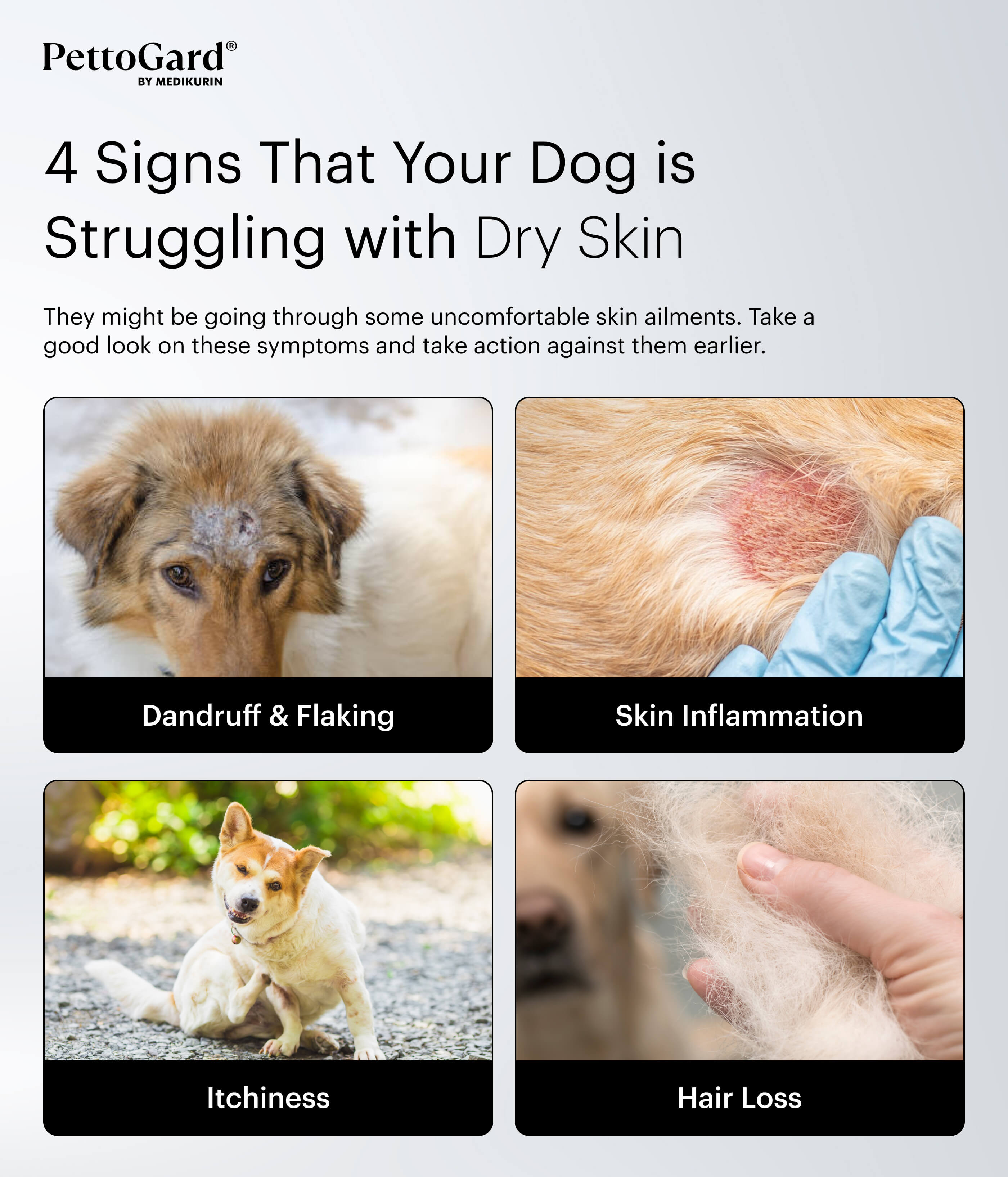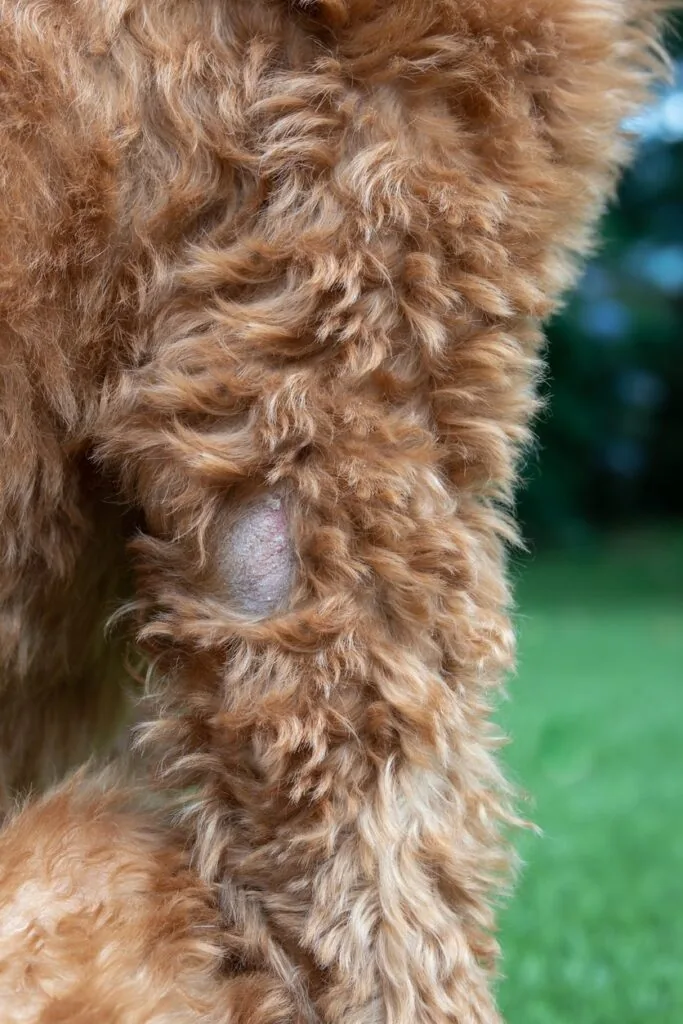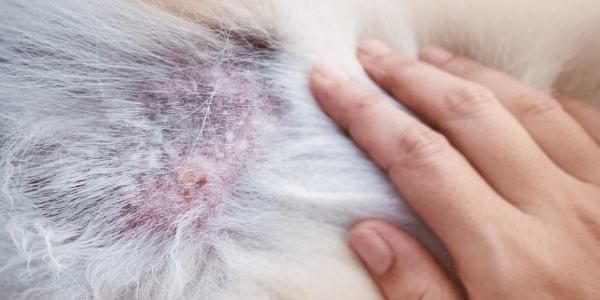Omega-3 fatty acids and moisturizing shampoos help dogs with dry skin. Regular vet visits ensure proper diagnosis and treatment.
Dry skin can make your dog uncomfortable and cause itching, flaking, and irritation. Identifying the underlying cause is crucial for effective treatment. Common reasons for dry skin include allergies, poor diet, and environmental factors. A balanced diet rich in omega-3 fatty acids can improve your dog’s skin health.
Moisturizing shampoos and conditioners specifically designed for dogs also provide relief. Regular grooming helps distribute natural oils evenly across the skin. Always consult your vet for a tailored approach to your dog’s skin issues. By addressing dry skin promptly, you can improve your dog’s comfort and overall well-being.
Common Causes
Dogs can have dry skin due to various reasons. Understanding these causes helps in treating the condition effectively. Below are some common causes of dry skin in dogs.
Environmental Factors
Environmental factors play a big role in your dog’s skin health. Dry air, especially in winter, can make your dog’s skin dry. Frequent bathing with harsh shampoos can also strip away natural oils. Allergens like pollen, dust, and mold may cause skin irritation.
| Environmental Factor | Impact on Skin |
|---|---|
| Dry Air | Reduces skin moisture |
| Frequent Bathing | Strips natural oils |
| Allergens | Cause irritation |
Dietary Issues
Your dog’s diet directly affects their skin. A lack of essential fatty acids can lead to dry, flaky skin. Poor-quality dog food may not provide the necessary nutrients. Allergies to certain foods can also cause skin problems.
- Essential Fatty Acids
- Poor-Quality Dog Food
- Food Allergies
Ensure your dog gets a balanced diet. Include foods rich in omega-3 and omega-6 fatty acids. Consider high-quality dog food. Consult your vet for any dietary changes.

Credit: medikurin.com
Signs To Watch For
Dry skin can cause discomfort for your dog. Knowing the signs can help. Here are some key indicators to look out for.
Visible Symptoms
Dry skin on dogs can show through visible symptoms. These signs are easy to spot:
- Flaky or scaly skin
- Red or inflamed patches
- Bald spots
- Scabs or sores
Behavioral Changes
Dogs with dry skin might show behavioral changes. These behaviors include:
- Excessive scratching or licking
- Frequent rubbing against furniture
- Restlessness or irritability
Keeping an eye on these signs can help your dog feel better. Early detection is key to effective treatment.
Effective Remedies
Dogs with dry skin can feel uncomfortable and itchy. Thankfully, there are many remedies that can help. From natural oils to soothing baths, these treatments can bring relief to your furry friend.
Oatmeal Baths
Oatmeal baths are great for dogs with dry skin. Oatmeal soothes and moisturizes the skin. Here’s how you can prepare an oatmeal bath:
- Grind plain oatmeal into a fine powder.
- Fill your bathtub with warm water.
- Mix the oatmeal powder into the water.
- Place your dog in the tub and let them soak for 10-15 minutes.
- Rinse your dog with clean, warm water.
Use this remedy once a week for best results. Oatmeal has anti-inflammatory properties. It reduces itching and irritation.
Coconut Oil
Coconut oil is another excellent remedy. It helps moisturize and heal the skin. You can use it in two ways:
- Topical Application: Rub a small amount of coconut oil directly onto your dog’s skin. Focus on the dry and irritated areas.
- Dietary Supplement: Add a small amount of coconut oil to your dog’s food. Start with 1/4 teaspoon for small dogs and 1 teaspoon for large dogs. Gradually increase the amount.
Coconut oil contains lauric acid. This acid has antibacterial and antifungal properties. It can help treat skin infections and promote healing.
“`Dietary Adjustments
Many dogs suffer from dry skin. One effective way to help is through dietary adjustments. What your dog eats can have a big impact on their skin health. Making the right changes can improve their skin condition.
Essential Fatty Acids
Essential fatty acids are crucial for a dog’s skin health. They help keep the skin hydrated and reduce inflammation. Omega-3 and Omega-6 fatty acids are particularly beneficial. These can be found in fish oil, flaxseed oil, and certain types of fish.
You can add fish oil supplements to your dog’s diet. They are available in liquid or capsule form. These supplements improve the skin and coat of your dog. Make sure to consult your vet before adding any supplements.
| Source | Type of Fatty Acid |
|---|---|
| Fish Oil | Omega-3 |
| Flaxseed Oil | Omega-3 |
| Safflower Oil | Omega-6 |
Hydration
Proper hydration is vital for your dog’s skin health. A well-hydrated dog will have healthier skin. Always provide fresh, clean water for your dog. This helps prevent dry skin and other health issues.
You can also add moisture to your dog’s diet. Wet dog food contains more water than dry kibble. This can help improve your dog’s overall hydration.
Foods rich in water content can also be beneficial. Fruits like cucumbers and watermelon can be given as treats. Just make sure they are safe and suitable for dogs.
- Always have fresh water available
- Consider adding wet food to their diet
- Include water-rich fruits and vegetables
Topical Treatments
Topical treatments can provide immediate relief for dogs with dry skin. These treatments soothe irritation and moisturize the skin. Here are some effective topical solutions you can use.
Aloe Vera
Aloe Vera is a natural remedy for dry skin. It contains anti-inflammatory properties that help reduce itching and redness.
- Apply Aloe Vera gel directly to the affected area.
- Use pure Aloe Vera without added chemicals.
- Apply twice a day for best results.
Aloe Vera also has cooling effects. This helps soothe your dog’s skin quickly.
Medicated Shampoos
Medicated shampoos are designed to treat dry skin. They contain special ingredients that target specific skin problems.
| Type of Shampoo | Ingredients | Benefits |
|---|---|---|
| Anti-Fungal | Ketoconazole, Miconazole | Reduces fungal infections |
| Anti-Bacterial | Chlorhexidine, Benzoyl Peroxide | Eliminates bacteria |
| Anti-Itch | Oatmeal, Hydrocortisone | Soothes itching |
Use medicated shampoos as directed by your vet. Overuse can dry out the skin further.
Always rinse thoroughly to remove all shampoo residue. This prevents further irritation.

Credit: westloopvet.com
Preventive Measures
Dry skin in dogs can be uncomfortable and lead to more serious issues. Taking preventive measures is crucial to ensure your furry friend’s skin stays healthy. Let’s explore some effective strategies.
Regular Grooming
Regular grooming is vital for your dog’s skin health. Brushing your dog removes dirt and dead skin cells. It also stimulates natural oil production, keeping the skin moisturized.
- Brush your dog at least once a week.
- Use a gentle shampoo designed for dogs.
- Avoid over-bathing to prevent stripping natural oils.
Proper Nutrition
Proper nutrition plays a significant role in maintaining healthy skin. A balanced diet provides essential nutrients that support skin health.
| Nutrient | Benefit |
|---|---|
| Omega-3 Fatty Acids | Reduces inflammation and keeps skin hydrated. |
| Vitamin E | Promotes skin repair and regeneration. |
| Zinc | Supports skin integrity and immune function. |
Include foods rich in these nutrients in your dog’s diet. Consult your vet for dietary recommendations.
When To See A Vet
Dry skin in dogs can be a nuisance. It’s important to understand when to see a vet. This ensures your furry friend stays healthy and comfortable.
Persistent Issues
If your dog’s dry skin persists for more than a week, consult a vet. Persistent dryness could indicate an underlying issue. Conditions such as allergies or infections might be the cause. Regular vet visits help identify and treat these problems early.
Here are some signs that your dog’s dry skin might be a persistent issue:
- Constant scratching
- Flaky or scaly skin
- Red or irritated patches
Severe Symptoms
Severe symptoms of dry skin in dogs need immediate attention. Look out for these signs:
- Bleeding or open sores
- Hair loss in patches
- Swelling or hot spots
If you notice any of these symptoms, it’s critical to visit a vet. Severe symptoms can lead to infections and other health issues. Early treatment can prevent complications and ensure your dog’s well-being.
Here’s a quick table summarizing the symptoms:
| Severity | Symptoms |
|---|---|
| Persistent | Constant scratching, flaky skin, red patches |
| Severe | Bleeding sores, hair loss, swelling |

Credit: www.barkandwhiskers.com
Home Care Tips
Home care tips are essential for dogs with dry skin. Simple changes can improve your dog’s comfort and health. Below are some effective home care tips.
Humidifiers
Using a humidifier can add moisture to the air. This helps to keep your dog’s skin hydrated.
- Place a humidifier in the room where your dog spends most time.
- Clean the humidifier regularly to avoid mold and bacteria.
- Opt for a cool-mist humidifier for safer operation.
Humidifiers can be especially useful during winter months. Dry indoor air from heating systems can make dry skin worse.
Avoiding Irritants
Keep your dog away from irritants to prevent dry skin.
| Irritant | How to Avoid |
|---|---|
| Chemical Cleaners | Use pet-safe cleaning products. |
| Harsh Shampoos | Choose a gentle, moisturizing dog shampoo. |
| Pollen | Wipe your dog down after outdoor play. |
Make sure to rinse your dog’s paws after walks. This removes potential irritants like salt and chemicals.
These home care tips can make a big difference. They can help in keeping your dog’s skin healthy and hydrated.
Frequently Asked Questions
What Causes Dry Skin In Dogs?
Dry skin in dogs can be caused by allergies, poor diet, or environmental factors. It can also result from parasites, infections, or underlying health issues.
How Can I Treat My Dog’s Dry Skin?
Treating dry skin in dogs involves using moisturizing shampoos, ensuring a balanced diet, and providing omega-3 supplements. Regular grooming helps too.
Are There Home Remedies For Dogs’ Dry Skin?
Yes, you can use coconut oil, oatmeal baths, and fish oil supplements as home remedies to soothe your dog’s dry skin.
Can Diet Affect My Dog’s Skin Health?
Absolutely, a balanced diet rich in essential fatty acids and nutrients significantly impacts your dog’s skin health. Poor diet can cause dry skin.
Conclusion
To help dogs with dry skin, use natural remedies and consult your vet. Regular grooming and a balanced diet are essential. Keep your dog’s environment humid and avoid harsh chemicals. Your furry friend will thank you for their healthier, itch-free skin.
Prioritize their well-being for a happier, more comfortable life.








